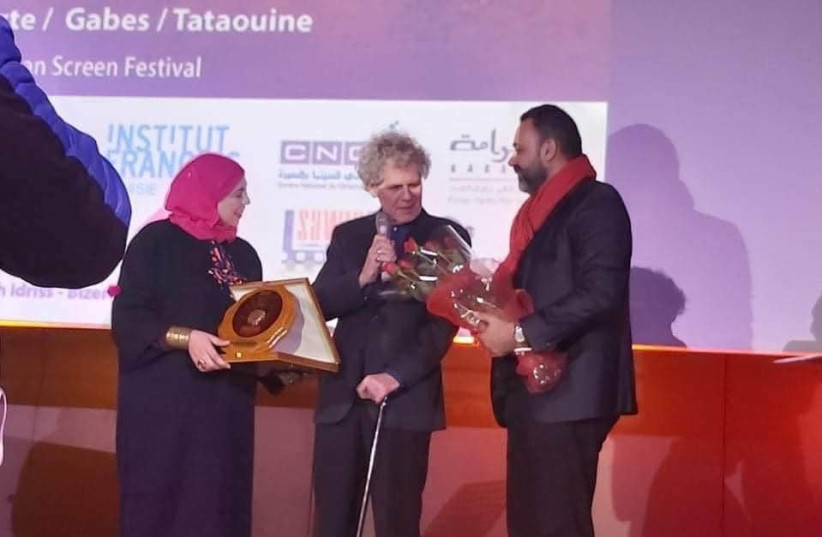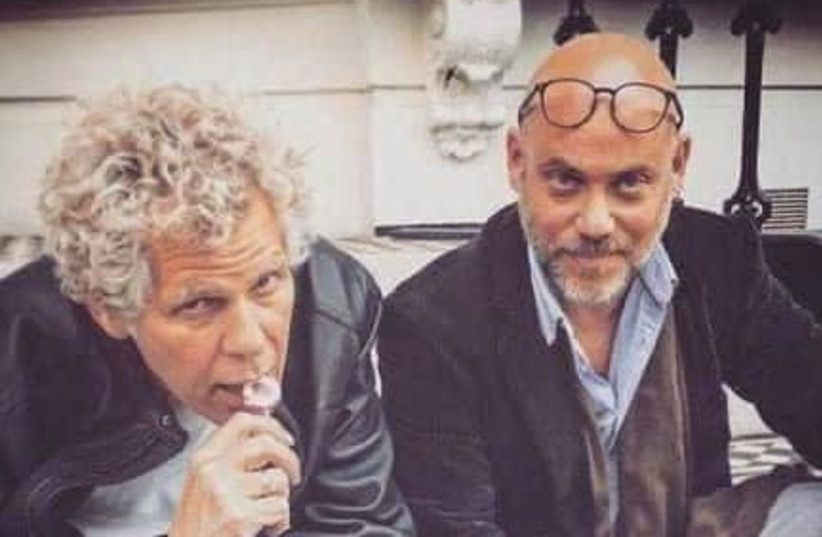On September 8, my wife Franny and I were invited to the United Nations Headquarters for the 2022 Global Congress of Victims of Terrorism. After the event’s three-hour opening ceremony in the General Assembly introducing diplomats and terrorism victims from around the world, the participants got down to work on their stated objective: “The promotion and protection of human rights and fundamental freedoms while countering terrorism.”
For more stories from The Media Line go to themedialine.org
The highlight of the opening ceremony was a heartfelt musical performance from the Manchester Survivors Choir of British teenage girls injured at the May 2017 Ariana Grande concert.
When we broke for lunch, Franny asked me, “Do you know what you’re going to say when they call you up there?”
“Yes, the same thing I’ve been talking about for 20 years: The Last Sermon of Prophet Muhammad, peace be upon Him.”
The author's experience as a terrorism survivor
The first time I spoke to an audience about Prophet Muhammad’s The Last Sermon was almost 20 years ago to reporters and camera crews gathered around my Tel Aviv hospital bed after I awoke from a coma. Three days earlier, after midnight on April 30, 2003, two British suicide bombers, affiliated with al-Qaeda and supported by Hamas, attacked Mike’s Place, a live-music bar next door to the US Embassy on the Tel Aviv beachfront. I was six feet away from the terrorist Asif Hanif when he shouted “Allahu akbar!” and detonated his explosives belt. It was a Tuesday, Mike’s Place’s popular “Jam Nite.” Over 50 people were wounded and three were killed that night: Yanai Weiss, Ran Baron, and Dominique Hass. Somehow, I survived.

I had arrived in Israel four weeks before the terrorist attack intent on making a documentary about Marwan Barghouti, a charismatic Palestinian leader going on trial in Tel Aviv for murder and for masterminding terror attacks during the Second Intifada. Barghouti was once considered a successor to Yasser Arafat. Israeli groups like Peace Now even believed Barghouti could be a “Palestinian Nelson Mandela” who might facilitate peace and reconciliation between Arabs and Israelis.
On the first day of Barghouti’s trial, an Israeli filmmaker told me she was already doing a documentary about the Palestinian leader and had been to Ramallah and interviewed Barghouti’s wife and lawyer. My naïve film project was kaput and I was finished tilting at windmills. I changed my airline ticket to return immediately to New York City instead of staying in Israel until the end of the month.
I walked out of the Ami Hotel toward the Mediterranean to do some serious drinking down by the beach.

“There is no superiority of an Arab over a non-Arab or of a non-Arab over an Arab, or of a White over a Black or of a Black over a White, except by righteousness and piety.”
Passage from Muhammad's Last Sermon
I told my tale of woe about Barghouti to the bartender/owner of Mike’s Place, Gal Ganzman. Gal said I needed to forget religion and politics and do a documentary about his live music bar. “We’ve got everybody here, Israelis, Arabs, Brits, Marines from next door. Mike’s Place is the movie you should make!”
In Ichilov Hospital three weeks later, I discovered an IV dripping morphine into my veins, my neck strapped into a brace, and burns on my face and arms, not to mention a brain contusion and ruptured eardrums. When I could focus on the reality of my situation, I found out I was partially paralyzed on my left side and had been wounded by “organic shrapnel” – microscopic pieces of the suicide bomber’s body lodged inside me.
“What are your feelings about the terrorists?” a reporter asked me.
I had to think fast and say the right thing, so I said nothing at first. Then Franny asked me, “Do you want to make a statement?”
“Yeah, I want to make a statement.”
What came to mind was a passage from The Last Sermon of Prophet Muhammad in 632 CE that I’d memorized. So, I said: “’There is no superiority of an Arab over a non-Arab or of a non-Arab over an Arab, or of a White over a Black or of a Black over a White, except by righteousness and piety.’ That is the essence of Islam. Not murder! That is the essence of Islam.”
Almost 20 years later, Franny and I were at the UN in Manhattan, invited to address its Global Congress of Victims of Terrorism. Again, I was thinking about what I needed to say. I heard the conference chairman call out, “Mr. Baxter, the Global Congress is starting, it’s time to take our seats.”
My mind strayed. Since surviving the attack, we had produced the award-winning documentary titled Blues by the Beach about the attack and the re-opening of Mike’s Place directed by the American/Israeli filmmaker, Joshua Faudem. Fourteen years later in 2017, Joshua and I had traveled across Europe in a follow-up documentary titled The Last Sermon, visiting refugee camps and mosques on our way to England to try and meet with the families of the two British suicide bombers who had attacked Mike’s Place.
The Last Sermon had its world premiere at the 6th International Human Rights Film Festival in Tunis where it was awarded the Prix de l’Espoir – Prize of Hope. I had traveled to Tunisia with Dr. Iyad AlDajani in February of 2020. AlDajani is a Palestinian peacemaker and reconciliation scholar from East Jerusalem. He has screened his Arabic-subtitled film trailer of The Last Sermon in Europe and Washington, DC, and coordinated university screenings of the full film in Qatar and elsewhere in the Muslim world.
This past May, Dr. AlDajani and I spent a week in the United Arab Emirates meeting with prominent educators and businesspeople in Abu Dhabi and Dubai about screening The Last Sermon in the UAE. We are both convinced that the film’s message of our common humanity, regardless of race and ethnicity, needs to be communicated to everyone everywhere.
And I personally believe that The Last Sermon of Prophet Muhammad, peace be upon him, is the most effective way to counter and defeat the ideology underpinning religious extremism and international terrorism.
April 30, 2023 will be the 20th anniversary memorial of the Mike’s Place attack. Gal and his brother Assaf Ganzman are emailing invitations to the Mike’s Place family now scattered throughout the world. The Tel Aviv Cinematheque has already scheduled a screening of Blues by the Beach for April 28 followed by a celebration of life back at the bar with musicians of every color and religion and nonreligion, playing their respects.
It was my turn to speak at the UN. It seemed to me that the words of Prophet Muhammad in 632 CE were still valid and so I repeated them.
Franny and I will be in Israel next April to remember and honor our friends.
Inshallah – God willing.
Jack Baxter is a writer, director, producer and freelance journalist from New York City. He directed and produced the 1995 documentary Brother Minister: The Assassination of Malcolm X. He and his wife Fran Strauss-Baxter are the producers of the documentary, Blues by The Beach (2004). He is the co-author of the graphic novel, Mike's Place: A True Story of Love, Blues, and Terror in Tel Aviv (2015). His documentary The Last Sermon (2020) was awarded the Prix de l'Espoir at the 6th International Human Rights Film Festival in Tunis, Tunisia.
